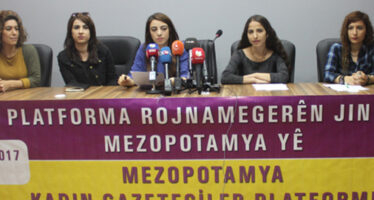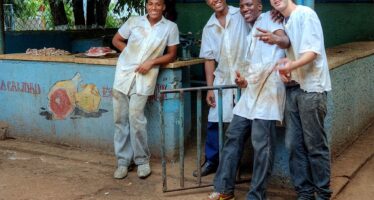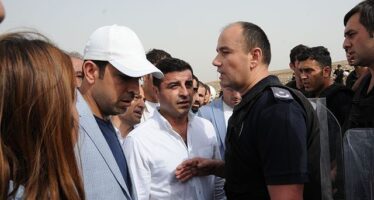Saudi Arabia: Elected to the UN Commission on the Status of Women

![]()
“Dozens of Saudi women have told Human Rights Watch that the male guardianship system is the most significant impediment to realizing women’s rights in the country, effectively leaving adult women legal minors who cannot make key decisions for themselves.” (Human Rights Watch)
On April 19 last, United Nations member states elected Saudi Arabia to serve on the UN Commission on the Status of Women, a body “dedicated to the promotion of gender equality and the empowerment of women.” The election was by secret ballot and the country elected will serve for a four-year term.
According to the U.N., the kingdom will now be responsible for “promoting women’s rights, documenting the reality of women’s lives throughout the world, and shaping global standards on gender equality and the empowerment of women”.
Right. Sure. Why not? Or maybe, more correctly: “give me a break”..?
Because since then, the ripples of protest and indignation have been widening and their message of frustration with the decision caused a temporary uproar in some European countries and among human rights activists… Despite everyone knowing that standards have fallen in recent times in the places of power, (if they had ever been at any other level)…
For those that don’t know, in gender-segregated Saudi Arabia, and particularly under the Saudi’s discriminatory male guardianship system, women are not allowed to drive their own cars, they are not allowed wear clothing that emphasises their beauty, they need to be careful in their interactions with men, they cannot go for a swim unaccompanied, they cannot compete freely in sport and they must obtain the permission of a male guardian before they can travel outside the country, work or marry. And that’s only the beginning of the story…
Human Rights Watch‘s 2017 Report adds:
“Saudi Arabia’s discriminatory male guardianship system remains intact despite government pledges to abolish it. Under this system, adult women must obtain permission from a male guardian—usually a husband, father, brother, or son—to travel, marry, or exit prison. They may be required to provide guardian consent in order to work or access healthcare. Women regularly face difficulty conducting a range of transactions without a male relative, from renting an apartment to filing legal claims. All women remain banned from driving cars in Saudi Arabia.
Following municipal elections in December 2015, 38 women were elected or appointed to councils with a total of 3,159 members across the country for the first time. In February, however, authorities ordered that the councils must be segregated by sex, with women members sitting in separate rooms away from their male colleagues and participating only by video link.”
Thus Human Rights Watch has described Saudi Arabia’s election, which was supported by 47 states, “including at least three European countries”, as an “affront to the mission of the commission itself, and a rebuke to Saudi women”. They also described the decision as “shocking” while the co-founder of global women’s rights organisation Code Pink criticised the decision as “disheartening and so revolting”, saying, of the 193 UN member states, Saudi Arabia has one of the worst records with regard to the status of women: “We are disgusted to hear that Saudi Arabia, one of the worst human rights and women’s rights violators, was just elected to the UN Commission on the Status of Women by a secret ballot. The United States is a leading voice on that commission, but the U.S. Ambassador to the UN, Nikki Haley, probably voted in favor of the Saudi regime and refuses to speak out against this outrageous hypocrisy.”
Human Rights Watch also said: “The Saudi government’s seat on the commission should not stop it from standing with Saudi women seeking to empower themselves. It can start by calling on Saudi Arabia to release Mariam al-Oteibi and Dina Ali Lasloom, and guarantee their right to travel freely, live independently, and make decisions for their own lives, and then urge the government to finally deliver on its promise to take holistic steps to scrap the guardianship system altogether.”
Dina Ali Lasloom, 24, on April 10 this year: “attempted to flee to Australia from Kuwait to escape the restrictions imposed by her family, only to be returned to Saudi Arabia while in airport transit in Manila in the Philippines. According to a Saudi official, she is now in a detention center facing indefinite detention or possible forced return to the family she fled.”
Mariam al-Oteibi, 29, “fled abusive family members in al-Qassim Province for Riyadh, only to be captured by authorities and jailed for having the temerity to dream of making her own life decisions. She currently sits in Buraida Prison back in al-Qassim.” (Human Rights Watch)
While here in Ireland, despite urging by opposition deputies, the Department of Foreign Affairs continues to refuse to say which way Ireland voted; Ireland’s Ambassador to the UN is the chair of the bureau of the women’s rights commission, which coordinates that body’s work. The suspicion is that money rather than a commitment to human rights did the voting. Of all the states that participated in the vote, only Belgium’s prime minister later said he regretted his country’s vote supporting the repressive regime: “A vote was expressed. I am not saying that the position is secret. I regret this vote. We will draw the consequences of this in the future and I have given instructions for a political assessment to be made at the highest level in order for this not to occur again. In short, we are fully determined to promote the universal values of human rights.”
UN Watch, the Geneva based accredited NGO whose goal is to “monitor the performance of the United Nations by the yardstick of its own Charter” estimates at least five of 12 EU states on the council voted in favour of Saudi Arabia. In 2014, UN Watch strongly condemned the recent elections of Saudi Arabia, China, Cuba, and Russia to the Human Rights Council. “In an interview by France 24 (below), executive director Hillel Neuer called this a “black day for human rights.” A campaign to remove these countries from the body, “Dictator-free HRC” is ongoing along with a petition on the organisation’s website.
Azad Essa, a journalist at Al Jazeera said: “Saudi Arabia has been buying its way into international meetings; and as it currently stands, should have no place in shaping the world order…
Look at the rest of the make-up of the commission: Algeria, Ghana, Haiti, Kenya, Iraq, Comoros, the Democratic Republic of the Congo Japan, South Korea, Turkmenistan, Ecuador, Haiti and Nicaragua. Do we honestly believe that this list, as a collective, can effect any meaningful change when it comes to advancing the rights of women?”
He concluded: “In this universe, gender rights only mean securing space in a patriarchal system that disregards the poor, expands the military-industrial complex and finds reasons to oppress women, especially women of colour.
This is a world that appropriates the bravery of Malala Yousafzai and turns her image into a caricature of empire.
As it turns out, Saudi Arabia is already very much part of the world. To pick on Saudi’s gender record at home is, frankly, too easy. Lest we forget that last year Saudi Arabia was voted into the UN Human Rights Council, the principal UN body dealing with human rights, while simultaneously bombing Yemen to smithereens…”
…And so our world travels on, with insult now being added to injury… each day inflicted on the innocent citizens of a deteriorating planet who continue to suffer from the actions, conspiracies, regimes and perpetrators of this pervasive culture of oppression we are forced to endure each day…while we wait for the Dark Ages of this enormous denial of even the most basic of human rights to be transformed and pass on…
Sources & References
Image:
By Carlos Latuff – http://twitpic.com/5dqlk4, Public Domain, https://commons.wikimedia.org/w/index.php?curid=15554086
Other References:
Full Text: Belgian PM 'regrets' electing Saudis to U.N. Women's Rights Commission
https://www.hrw.org/report/2016/07/16/boxed/women-and-saudi-arabias-male-guardianship-system
https://www.hrw.org/news/2017/04/28/how-was-saudi-arabia-voted-un-womens-panel
https://www.hrw.org/world-report/2017/country-chapters/saudi-arabia
http://www.codepink.org/saudiarabia
Video:
Belgians Waffle: PM Regrets Electing Saudis to UN Women, FM Defends
Why Saudi Arabia won seat on U.N. women’s rights body – Hillel Neuer on France24
Irish FM Refuses to Disclose if Helped Elect Saudis to U.N. Women’s Rights Body
UN Watch: Black Day for Human Rights’: Hillel Neuer
on France 24 TV
Related Articles
SETA report targets journalists, said Mesopotamia Women Journalists Platform
![]()
We publish the the written statement issued by the Mesopotamia Women Journalists Platform about the SETA report
TURKEY ON TRIAL a.k.a. The Trial of Selahattin Demirtaş
![]()
The co-chairperson of the left-wing People’s Democratic Party – HDP – Partiya Demokratîk a Gelan – Selahattin Demirtaş, arrested on November 4, 2016 and now, following his non-appearance in court one week ago on Thursday 7 December his detention has been extended





